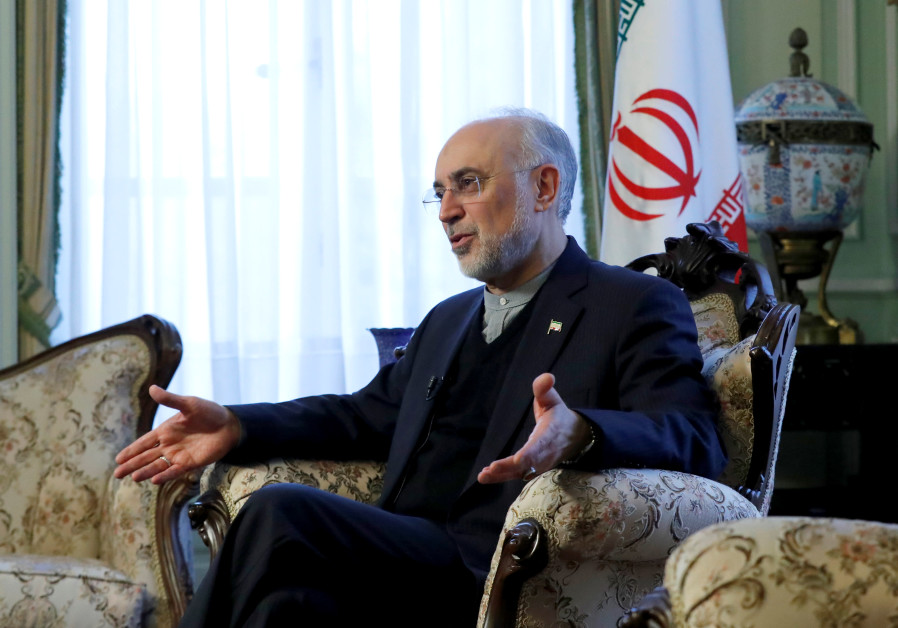Germany refuses to disclose Iranian attempts to buy nuclear, missile technology

Iran’s nuclear chief Ali Akbar Salehi gestures as he speaks to Reuters during an interview in Brussels, Belgium November 27, 2018. (photo credit: YVES HERMAN/REUTERS)
Washington, D.C. — The German foreign ministry declined to reveal statistics covering illegal Iranian efforts to secure nuclear and missile technology across Europe, according to a March 18 ministry letter reviewed by The Jerusalem Post.
“A statistic in the field of foreign trade is not kept at the [German] customs criminal office,” in connection with the Iranian regime’s attempts to obtain the technology, wrote German state minister Niels Annen in the letter.
FoxNews.com reported on Germany’s concealment of important data that could establish Iranian regime violations of the 2015 nuclear deal, formally called the Joint Comprehensive Plan of Action, and sanctions targeting the Islamic Republic’s missile program.
In late February, the German Left Party sent a parliamentary query to the federal government, asking for the number of cases, inquiries, and the results covering Iran’s violations of sanctions conducted by Germany’s customs criminal office between 2015 and 2018.
The social democratic deputy foreign minister Niels Annen, who is considered sympathetic to Iran’s clerical regime and celebrated the Iranian revolution in late February at Tehran’s embassy in Berlin, wrote that the government’s disclosure policy has not changed.
However, according to a March 19 German-language T-online report, the reporter Jonas Mueller-Töwe wrote that the German government‘s failure to provide transparency about Iran’s possible violations of sanctions contradicts the country’s past practice.
Mueller-Töwe said that Annen’s claim that the disclosure policy has not changed “is not correct.”
The T-online article reported that “until 2004, the federal government had the data of the Customs Criminal Office still country-specific and detailed in their arms export reports” covering goods involved, the investigations jumpstarted and their results.
“We have nothing to add to the reply of Minister of State Annen,” a spokesperson for German Chancellor Angela Merkel said in a statement to Fox News.
A spokesperson for Germany’s foreign ministry reiterated to Fox News the European Council position from February regarding Iran’s rocket program: “The Council is also gravely concerned by Iran’s ballistic missile activity and calls upon Iran to refrain from these activities, in particular ballistic missile launches that are inconsistent with UN Security Council resolution 2231. Iran continues to undertake efforts to increase the range and precision of its missiles, together with increasing the number of tests and operational launches.”
The EU Council added, “These activities deepen mistrust and contribute to regional instability. The Council calls on Iran to take all the necessary measures to fully respect all relevant UN Security Council resolutions related to the transfer of missiles and relevant material and technology to state and non-state actors in the region. In a broader context, the Council also recalls its longstanding serious concern at the regional military build-up.”
The Post reviewed a German intelligence report from 2018 that wrote, “Iran continued to undertake, as did Pakistan and Syria, efforts to obtain goods and know-how to be used for the development of weapons of mass destruction and to optimize corresponding missile delivery systems.”
One explanation for Germany’s refusal to disclose the statistics on Iranian regime violations of the JCPOA and sanctions could be Berlin’s flourishing trade relationship with Iran. A second explanation might be the Merkel administration’s intense devotion to preserving the JCPOA. Violations of the JCPOA and sanctions could jeopardize the Iran deal that Merkel has prioritized as an overarching priority for her government.
Join Jerusalem Post Premium Plus now for just $5 and upgrade your experience with an ads-free website and exclusive content. Click here>>






Comments are closed.